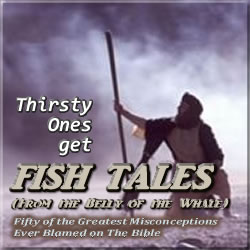Concepts in Misconceptions (Cont’d)
Discerning the Original From the Counterfeit
How do we go about rescuing the truth from centuries-old incursions? How do we strip away so many layers of disinformation? Like most fallacies that humans insist on embracing, a great misconception is always based on a foundation of genuine truth. The more closely an idea seems to originate from a legitimate basis, then all the better, no matter how absurd or outrageous that idea appears.
Such is the case with the familiar adage: “Once in grace, always in grace.” It doesn’t matter that it’s not in The Bible. People assume it’s there because it sounds scriptural. That’s because, in principle, it is based on real biblical wisdom. The only problem: The principle speaks of God’s integrity and faithfulness, and not—I repeat, not—of those who are trying to connect with Him because He can be trusted.
Unfortunately, the idea that once you’ve entered into a relationship with God you’re locked into a perpetual relationship with Him, no matter what you do thereafter, simply has no scriptural foundation. To this very point The Book of Hebrews is quite emphatic, from first to last. According to it, you stay in God’s grace if, and only if, you continue in the way you began.1 You begin your relationship with God by having faith, and therefore you must continue the trip, right up until the end, with the same kind of faith that got you started.
Otherwise you end up like those miserable Israelites, who began their wilderness journey in faith, having witnessed God’s deliverance at every turn, only to find themselves wandering in a circle for four long decades, just a few miles short of the Promised Land.2
Story Continues Below
Says Richard Price—the founder and CEO of Academia.edu—on his podcast In Depth With Academia:
Fish Tales (From the Belly of the Whale): Fifty of the Greatest Misconceptions Ever Blamed on The Bible is:
To hear Price’s book review of Fish Tales (From the Belly of the Whale), CLICK HERE.
To hear Kent and Zen Garcia talk about correcting biblical misconceptions, from October 28, 2021, CLICK BELOW.
Story Continues From Above
So, apart from having to get over the shock that this verse isn’t in The Bible, the next question is: How does one tell the difference, logically and honestly, between the original truth and its counterfeit?
The answer: In spite of all the forces that obscure the truth, the forms of disinformation still persist in revealing conspicuous patterns, so that upon further inspection of these patterns, a higher truth emerges which enables us to discern the original from the counterfeit.
To demonstrate this, let’s consider the next aspect of a great misconception. Take an actual truth found in The Bible, and isolate it from its context. Again, the more subtle that this process of isolation is executed, all the better. In this way, almost any manner of disinformation can be blamed on The Bible.
A classic example of this technique involves a famous passage in the twenty-fourth chapter of The Gospel of Matthew where Jesus’ disciples asked Him when the End of the Age would occur. As tradition would have us believe, Jesus told them that not even He knew when it would occur, that only His Father in Heaven knew the day or the hour. But if you examine the context of His conversation, you might be surprised to find out that Jesus really said:
Heaven and Earth will pass away, but My words will never pass away. No man knows about that day or hour, not even the angels in Heaven, nor the Son, but only the Father.3
From this, we see that Jesus was talking about the day when Heaven and Earth will pass away, and not His Second Coming, which as anyone who’s studied The Bible knows will be followed by the long-awaited Millennial Reign. Then, after the Millennium, Satan, who’s bound for the duration of this thousand-year period, will be loosed for “a little season,” after which he leads one final rebellion against God and is then thrown into the Lake of Fire.4
By allowing the context of this statement to convey its meaning, we’re able to determine what day and hour Jesus was really talking about. He was describing an event that occurs at a different moment in the biblical timeline—after the Second Coming, after the Millennium, after the “little season,” after Satan is thrown into the Lake of Fire, and after the Final Judgment. Following all of these events, then, the twenty-first chapter of The Book of Revelation opens with the words:
And I saw a new Heaven and a new Earth; because the first Heaven and first Earth had passed away, and the sea was no more.5
Another persistent pattern of the great misconceptions of The Bible is to take a truth found in Scripture and, through a sustained campaign of manipulation, create a new version that eventually becomes synonymous with the original truth, thereby replacing it in the memory traces of humanity.
For example, there’s the case of probably the most familiar verse ever to be blamed on The Bible. In its original form, it reads as the Apostle Paul warning Timothy that “the love of money is the root of all evil.” But so many centuries of distortion have woven such an impenetrable blanket of tradition over this passage that everyone is now convinced that Paul said, “Money is the root of all evil.” Such a huge shift in meaning, and all accomplished through the omission of just three little words: “…the love of.”
Likewise, The Bible contains the well-known prohibition in the form of the Sixth Commandment. In it, we read: “You should not kill.” As a result, generation after generation have read this verse as condemning any form of killing, no matter how justified it might seem in human terms. Usually one hears this verse being intoned in the context of self-defense or police protection.
But anyone who takes the time to read this passage in the original Hebrew language will discover that it actually reads: “You should not murder.” Naturally, this interpretation dramatically shifts the meaning of this passage, thereby easing the conscience of many a dutiful soldier or police officer.
By correctly translating such words, we’re also able to understand events which have long plagued readers of The Old Testament, who find themselves confused by a God Who apparently has no problem with sending the Israelites into battle after battle, in the much-understood Conquest of Canaan.
There you have it. You’ve seen how to create a great misconception of The Bible. Understand this subtle yet powerful process, and you’ll be better prepared to reverse its effect in your own life. Let’s review.
Step One: Latch onto a truth that seems to be so thoroughly based on Scripture that upon hearing it your audience is convinced it’s in there, as in: “Once in grace, always in grace.” Never mind that you can’t find it in The Bible. So what; it sounds like it is, right?
Step Two: Isolate a known passage from its context so that ever after no one suspects there might be an alternative meaning of those words, like when Jesus said, “No one knows the day or the hour, not even Me.” Who cares if this passage isn’t referring to the event that tradition claims it does, as long as everyone agrees that it is.
And finally, Step Three: Repeat this new version of the “truth,” until eventually whatever truth was once obvious is rendered altogether alien from its initial reality, as with the supposed verses: “Money is the root of all evil” or “You should not kill.”
In this way, even a solid mountain of truth can be whittled away until there’s nothing left but a dusty pile of clichés. Thus, what Jesus said has never been truer:
You reject the commands of God so you can keep your own vain traditions, but by persisting on teaching such nonsense, you simply make God’s word useless to you.” Mark 7:9, 13







